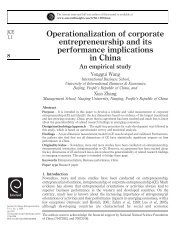Corporate entrepreneurship: teaching managers to be entrepreneurs
Corporate entrepreneurship: teaching managers to be entrepreneurs
Corporate entrepreneurship: teaching managers to be entrepreneurs
You also want an ePaper? Increase the reach of your titles
YUMPU automatically turns print PDFs into web optimized ePapers that Google loves.
JMD22,4342<strong>entrepreneurs</strong>, with some championing at the senior level, <strong>to</strong> start <strong>to</strong> seeresults..A lot of ordinary corporate citizens can learn <strong>to</strong> act as corporate<strong>entrepreneurs</strong> with the right education, training, and support. The mostcritical piece is that they are helped <strong>to</strong> develop an idea that theythemselves are turned on <strong>to</strong>. Without this passion, it would <strong>be</strong> hard <strong>to</strong>imagine anyone willing <strong>to</strong> fight the uphill battle that many of our would<strong>be</strong><strong>entrepreneurs</strong> had <strong>to</strong> do. This really speaks <strong>to</strong> the mindset of theentrepreneur. Passion can’t <strong>be</strong> taught, but it can <strong>be</strong> encouraged. The skillset, however is much easier <strong>to</strong> teach. Market analyses, cash flow analysis,operations management etc., can <strong>be</strong> taught, as we know from workingwith MBAs and other executives..Catalytic coaching and the business planning process were the two mostimportant educational <strong>to</strong>ols for the development of new businessopportunities. Catalytic coaching sounds like an oxymoron, but itinvolved pushing <strong>managers</strong> <strong>to</strong> move from an iterative focus <strong>to</strong> a platformfocus. Most <strong>managers</strong>, when asked <strong>to</strong> think about new businessopportunities, tend <strong>to</strong> start close <strong>to</strong> home with iterative, relatively smallchanges <strong>to</strong> products or services. It takes a push from a coach whoaggressively challenges this “close <strong>to</strong> home” mentality typically found inthe ideation phase. We saw many mediocre ideas blossom in<strong>to</strong> trulyentrepreneurial ideas as a result of this type of coaching. In addition, thisis where some of the real passion developed within the corporateentrepreneur. They started <strong>to</strong> fall in love with their ideas, especially whenthey <strong>be</strong>came really interesting and more risky. Many of Mott’s peoplestarted off with ideas about packaging and apple sauce color. At the endof the program they were thinking about day care centers and managingbrands for the World Wide Wrestling Federation, a far cry from blueapple sauce. These types of ideas are more of a platform of ideas in thatthey leverage the corporation’s capabilities, but in<strong>to</strong> significantlydifferent product offerings or markets. The importance of the businessplan is obvious. Great ideas without the discipline of the businessplanning process are generally not great opportunities. This was the mostimportant <strong>to</strong>ol for differentiating the two and further shaping theopportunity. One of our <strong>entrepreneurs</strong> came <strong>to</strong> us in a pertur<strong>be</strong>d state<strong>be</strong>cause his business plan was telling him that he could not make anymoney with his original idea. He was afraid that he would some how “fail”the entrepreneurial course. We soundly congratulated him for notspending the company’s money on a bad idea and <strong>to</strong>ld him <strong>to</strong> find anotherone. This little s<strong>to</strong>ry says a lot. Being entrepreneurial also means knowingwhen <strong>to</strong> “pull the plug”..Entrepreneurs can come from anywhere in the organization. One of ourbiggest lessons was our inability <strong>to</strong> predict who could <strong>be</strong>come a corporate
















